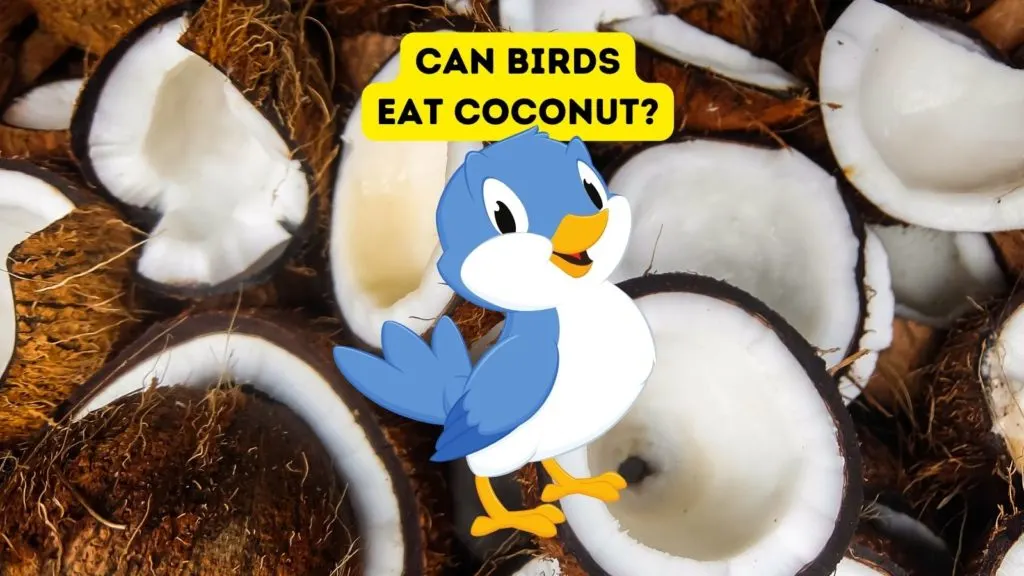We all picture tropical birds eating coconut flesh from coconuts that have fallen from the towering trees and smashed on the ground–but coconuts can be an intriguing option for many everyday backyard birds, too. This tropical fruit is not only nutritious but also offers a different texture and taste for wild birds. However, it’s important to understand the different forms of coconut to know which are safe to feed birds–and which you must avoid.

Nutritional Value of Coconut for Birds
- Rich in Fats and Oils: Coconuts provide high energy content, primarily in the form of fats and oils, which are beneficial for birds, especially in colder weather.
- Vitamins and Minerals: Coconuts also contain essential vitamins and minerals that can be a healthy addition to a bird’s diet.
Forms of Coconut and Their Safety for Wild Birds
Coconut comes in many forms; let’s look at the different forms of coconut that are safe for birds–and two that you must avoid.
Raw Coconut: Fresh, raw coconut meat is safe for birds. It should be offered in small, manageable pieces.
Coconut Oil: Pure coconut oil can be mixed with birdseed to make suet cakes, which provide a high-energy food source. Coconut, especially its oil, is packed with nutrients like healthy fats and antioxidants which encourages good feather health and facilitates better digestion for the birds.
Coconut Shells: The hard shells of coconuts can’t be fed to birds but they can be used as natural feeding bowls or birdhouse materials.
Dried Coconut: Unsweetened, dried coconut or desiccated coconut isn’t safe for birds. If a bird swoops in and eats on little piece, it’s no problem–but a belly full of this dried coconut that then rehydrates in their stomach is a problem. Save the dried coconut for your own treats and don’t feed it to the birds.
Sweetened or Flavored Coconut: Any coconut product with added sugars, sweeteners, or flavors should be avoided, as these can be harmful to birds.
Wild Birds Most Likely to Eat Coconut
- Various Tits and Chickadees: These small birds enjoy pecking at fatty foods and might be attracted to coconut pieces or suet cakes made with coconut oil.
- Blackbirds: Blackbirds are known for their versatile diet, which includes a variety of fruits and berries. They are likely to be attracted to coconut, especially when natural food sources are scarce. Offering coconut in a grated form or as small pieces can be particularly appealing to them.
- Robins: While robins primarily eat insects and worms, they also enjoy fruits and berries, particularly during the colder months when insects are less available. Robins can be drawn to coconut, especially when it’s offered in a way that’s easy for them to peck and consume.
- Woodpeckers: They often feed on suet and may enjoy coconut mixed into suet cakes.
- Nuthatches and Jays: Known for their love of nuts and seeds, these birds might also be drawn to coconut offerings.
Coconut can be a nutritious and enjoyable treat for various wild birds, offering them a taste of the tropics. By providing coconut in its raw, unprocessed form, or as part of homemade suet cakes, you can safely add variety to the diets of your backyard birds.
More Posts You Might Like
- Does Bird Seed Expire? - May 11, 2024
- How Big Are Baby Hummingbirds? - May 5, 2024
- How to Prevent Mold in Hummingbird Feeder - May 2, 2024
